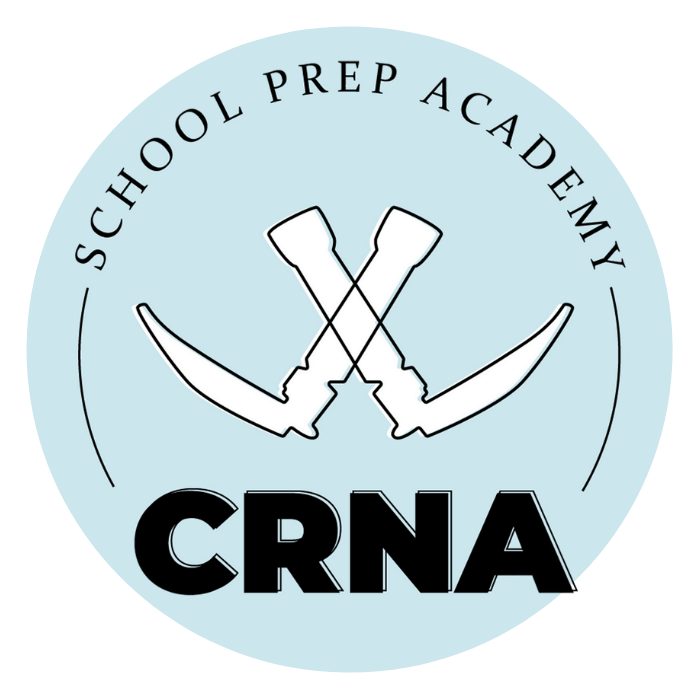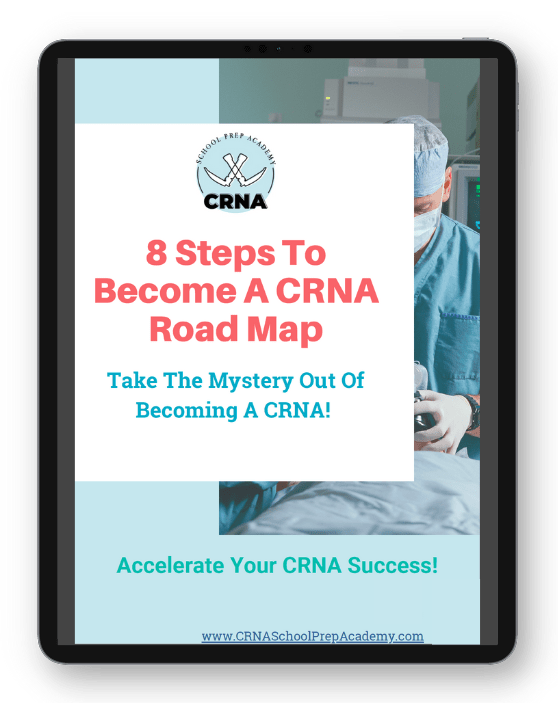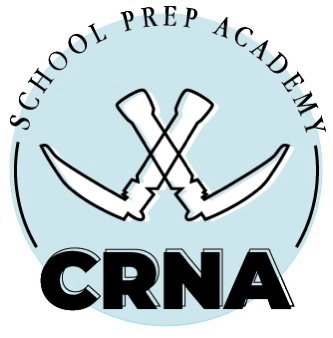
CRNA School Costs- CRNA School could be quite expensive, especially if you don’t plan for all your expenses ahead of time. Right now, the middle-of-the-road average for the cost of going into a CRNA school is around $80,000 to $90,000. You also have to keep in mind whether that school is the right fit for you; don’t just pick the most prestigious school out there. You have to do your research and really plan this all before you enter a program. Join Jenny Finnell as she breaks down what you need to consider when looking to enroll in a CRNA school. Find out how Jenny picked her school, how she survived all the student debt and the living expenses that come with it. Remember, it is really important to know your numbers. Prepare for anything expenses-wise when it comes to CRNA school.
Get access to planning tools, valuable CRNA Faculty guidance & mapped out courses that have been proven to accelerate your CRNA success! Become a member of CRNA School Prep Academy here:
https://www.crnaschoolprepacademy.com/join
Book a mock interview, personal statement critique, resume review and more at https://www.TeachRN.com
Join the CSPA email list: https://www.cspaedu.com/podcast-email
Send Jenny an email or make a podcast request!
Hello@CRNASchoolPrepAcademy.com
—
Watch the episode here
Listen to the podcast here
Is CRNA School Expensive?
How expensive is CRNA school? In this episode, I’m going to reveal the most affordable CRNA schools. I’m also going to discuss some things that maybe you haven’t thought about when it comes to paying for CRNA school. Let’s go ahead and get into the episode.
—
What To Consider Paying For CRNA School
In this episode, we are going to dive into CRNA school costs. What are some things maybe that you haven’t thought about? I’m also going to share some of the most affordable CRNA programs that are out there now. Without further ado, let’s get into what are some things to consider when paying for CRNA school. I want to address this first because I often get asked the question by aspiring CRNAs, “Will I get a better or higher paying job as a CRNA if I go to a very prestigious CRNA program, one that has a very big name?”
I hate to burst their bubble but the answer is no. You will not get paid more just because you go to a college that is prestigious like Yale, for example. You are not going to make any more money than I do who went to AK Rowdy. It’s Akron. I’m from Akron. They call it the AK Rowdy. It’s like the diamond in the rough. No one knows about it because it’s a small little city in the middle of Ohio.
That being said, again, what plays into how much you can make as a CRNA comes into the location and your work experience. Meaning, how much experience are you bringing to the table? Whether it’s 1099, PRN or W-2… what’s the competitive atmosphere of that work environment, as far as how many spots are there for one job? How many CRNA schools are in that city? Sometimes the more CRNA schools you get in a city, sometimes the more diluted that job market gets as far as you have more CRNAs being cranked out every year.
A lot of it can play into that. Cost of living is one of them but the biggest factor as far as landing your dream job, the high-paying dream job after school, is the amount of work you put into school. Essentially, the long-term job interview that you have as a student, as a resident, and as a CRNA in clinical. That is what matters most when it comes to getting that dream job after school versus picking a school that has a big name.
The other thing I want to point out is that I often hear people say, “That school is not ranked high.” Be cautious of those rankings! I’ve talked to program faculty about this because it’s brought up to me quite often. Like, “That school is ranked higher, so I will get more job offers or have a better experience if I go to this school that’s ranked high in the rankings.” Those rankings don’t sometimes mean a whole lot. I’m not saying they don’t. I’m not poo-pooing them completely but I also know the way they get those rankings could be money, the prestige of school leadership; it doesn’t necessarily reflect the experience of the students all of the time.
Take it for what it’s worth. I wouldn’t pick a school solely based on its rank in the Top 10 CRNA schools. I wish they would do away with that. Talk to current students from the programs and people. That’s the best way. When you go to find a job, for example, don’t go to a hospital that’s well-known because they have a big name. It might be miserable there. They are ranked high, but you may hate your life the same within CRNA school. Talk to current students in the program. That is by far the best way to get the insider scoop on how it is and how they are enjoying it in the program. That’s my piece of advice.
I used that advice for myself when I looked for jobs as a CRNA. I talked to CRNAs from those environments, made sure that they’re happy and that they are getting the experience in the work environment they desire. That is always going to be the best indication that you are also going to be happy in that work environment.
Take it from me because I didn’t do that one time and regretted it. Most of the things I share with you on this show a lot of times are things that I’ve made mistakes on, too. It’s so easy to go for the shiny object or go for something that you think has all the name recognition, but it’s not always as glorious as you think it is. “The grass is not always greener on the other side,” like that phrase. Is it worth paying $100,000 more for that CRNA program and other CRNA programs because they have name recognition? I don’t think so.
You will not get paid more just because you went to a prestigious college. You have to put in the work if you want to get paid. Click To TweetIf it comes back with good experience from current students and nurturing effective faculty, 110% pay the extra $100,000 compared to a school that maybe is less expensive but the students are miserable there. They are not getting the support they need. I don’t know but unfortunately, you are going to find some of the stuff out only by talking to current students and then compare. What I will also say is nothing is perfect. If you are expecting perfection and 100% everything, you are never going to find it. You are always going to have to have a give and take. Maybe a school is very great and supportive academically but maybe those clinical sites that they rotate through are rough.
That’s a give and take. Great support academically but maybe a little more of a brutal experience in clinical or vice versa. Maybe a more brutal experience academically but the clinicals are rock solid amazing, and you are going to be surrounded by a lot of people who are willing to take you under their wing to help and support you. That’s a good experience. What I can say, even from my own experience, is you are going to get a blend of both. You are never going to have 100% of anything. You are going to get great clinical experiences and not-so-great clinical experiences.
Academically though, I feel like that should be pretty solid. I was fortunate to where I feel like I had a good academic experience. That being said, we also went through a program director retiring and got a new staff member thrown into the fire with no lecture-prepared notes. I felt bad because it wasn’t their fault but they came in pretty much unprepared to teach certain lectures. That wasn’t the greatest experience. Academically, there’s a lot of self-study involved in that. Did it hinder me from graduating from passing boards? No. Absolutely not.
To a certain extent, when you go into CRNA school, you are an adult learner and take 100% responsibility for your learning. Now, that being said, I’m not saying it’s not up to the CRNA schools to provide you with that support. They do need to do that but you have to take the initiative when you feel like you need it; speak up and ask for things or do the extra things that you need for yourself as far as advancing your knowledge.
I made sure, two weeks into CRNA school when they said, “Start prepping for boards”, I was like, “I’m down. This is the pace you want me to take with that?” That was in addition to what we were doing during school. I stuck with it. I followed that, and I was very well prepared for boards. Had I not done that, I may have felt otherwise. I know some of my classmates ran into that problem. It’s not the school’s fault. They will tell you what you need to be doing, and sometimes some of it is up to you to do extra behind the scenes.
It’s not going to be part of your classwork. It’s going to be extra to do extra board prep on the side. Talk to current students. Is it worth paying the extra money? It might be if the students are incredibly happy there. They are like, “This is the best experience, the staff and the clinical. This is the best program. The simulation labs, I feel so supported.” A hundred percent shell out the extra money. If you talk to someone and they are like, “I’m struggling. This is that, and this is happening. It’s okay.”
Especially when compared to the other school that’s cheaper, and if that student says the same thing, “It’s okay,” then now you are comparing an apple to an apple. Pick one. If they are both the same, as far as the few students you spoke to, then pick the one that’s more affordable, in my opinion. I would speak to more than one student. There are some students who naturally will be more disgruntled towards their experience than others. You will find that all of the time.
You will have some students who are thriving and accelerating while other students are like, “This is the most miserable experience in my life,” but those are 2 different people, 2 different experiences, and 2 different support systems at home. Don’t just think “no” because one person says it’s awful. Consider the fact that that experience could not be from the school. It could be from whatever they have going on in their home life. Maybe they don’t have the support that they need in their personal life. That does play into it. There are a lot of things to consider other than price.

Take that for what it’s worth, for what I could share with you, as far as not to pick a school based on the name. You don’t get a better paying CRNA job afterward. What gets you that good-paying CRNA job is putting in the work in clinical, showing up with a smile on your face, a good attitude, willingness to learn, adapt, looking for and seeking out new opportunities. Show that you are there. Don’t watch the clock and be anxious to get out the door.
If you start embracing clinical like that, people are going to tell you that you are checked out. They will know that you are not there to learn. They will know that you are there to get the experience, check a box, graduate, and get on with your life. They won’t see that you are vested and want to work there afterward. I’m not saying only be a go-getter on the clinical sites that you want to work at. You should do that for all your clinical sites. Another thing that can happen is word of mouth.
CRNA is a small, tight-knit community. I feel like everyone knows everyone to some extent. As amazing and empowering it is to be embraced and supported by the community, you can equally build a bad reputation pretty quickly. You need to be cognizant of what you are doing, the choices you are making, what you are saying, and how you are treating others. That being said, when you go to take a CRNA job, one of the first things that will happen is that the chiefs of CRNA will come to the employees that are already working there and say, “Who knows so-and-so? Does anyone know anyone that knows this person that can speak to them? Should we hire them?”
I’m not joking. For students who are rotating clinically, you better believe that if you go the extra mile and you are that student who wants to learn, adapt, and show up with a great attitude, you will be begged to come work there. There will be like, “Please.” We have a student like that now, who they are like, “We have to recruit her. We have to get her. She’s amazing. She’s so enjoyable to work with. She’s on it.” That thing. They will recruit you because that’s how small and tight-knit this community is.
Some Ballpark Figures For School
Take that for what it’s worth. Know that the time in clinical and the effort you put into it is what you are going to get out of it. That’s how you land the high-paying CRNA positions. Let’s go more into the expense of CRNA school, to give you folks some ballpark figures. Keep in mind that some of these figures are incredibly low but it’s also because it’s in Puerto Rico.
I also want to point out that I found this out. I didn’t know this but when you train in Puerto Rico, you can stay in Puerto Rico and practice without ever passing boards, which is why when you look at the board passing rates of these programs in Puerto Rico, they are incredibly low, 50% sometimes. We are like, “How are they staying open?” It’s because, in Puerto Rico, you can practice as a CRNA without ever taking boards in Puerto Rico.
Once you finish and graduate, you can practice there but you won’t be board certified, meaning you can’t come to the mainland and practice here without first taking boards. If you are wondering, “What the heck is going on? How are these programs staying open?” That’s why I had to ask the same questions. I was like, “What is going on?” I didn’t know that but they are also going to be the most affordable.
If you can speak fluent Spanish and you are willing to travel over there for three years to get your education, you can take boards and come back here and practice as a CRNA and save a ton of money. The University of Puerto Rico, for example, is $16,000, and even out of state, $18,000. You are not going to be able to beat that. There are costs of relocating and things like that but a lot of people relocate for CRNA school. You should be able to speak Spanish. Relatively understand it. I do know they teach in English and things like that.
If you’re expecting perfection in everything, you're never going to find it. There’s always going to be a give and take. Click To TweetI don’t think that that should be a huge barrier but your patient population that you will be caring for will be heavily Spanish speaking, so keep that in mind if you were to pick that. I’m sure that they probably do some type of screen for that as well when they interview. I thought maybe you had to be able to learn in Spanish. That’s not the case. That’s what I originally thought, and I had a student correct me. They are like, “You don’t have to learn in Spanish.” That makes it a little bit easier then.
That’s by far going to be the cheapest route to become a CRNA as far as CRNA school expenses. The next one that is very low and it’s in the States is $25,000, and that’s in Southern Mississippi. That’s affordable, and that’s in Hattiesburg. There you go if you are willing to travel there. For the next one, I’m going to go down to a few of them. I’m not going to go through all of them because there are so many. In fact, I have a free resource that you can download. It goes over eleven schools that are under $60,000, and there are 50 CRNA schools that are under $100,000.
You also have to watch for in-state and out-of-state tuition. In-state tuition could be $50,000 but out-of-state could be $123,000. Keep that in mind. It could be a pretty big jump.
The school that I’m talking about that is a total of $50,000 is UNCG, North Carolina Greensboro, and Florida Gulf Coast is $41,000 in-state; out-of-state it’s $140,000. To get in-state tuition, you usually have to be a resident for a year before you qualify for in-state tuition. If you are traveling, for example, and you are trying to seek out what serious schools to apply to, maybe look at the prices of programs if that’s a big thing for you.
If that’s a big determining factor of where you are going to apply to school, plan your assignments as such. Maybe plan on traveling in Florida for a year, get a permanent place of residence prior to applying for school and stay there for school. Travel, settle in, and go to school in Florida for in-state tuition.
It is going to take some planning. If your goal is to try to find the most affordable school, you want to go for in-state tuition if possible, which means you need to be moving there for at least a year in most cases. Some states are longer than that. Again, you are going to have to research this prior to even probably starting in ICU. Especially if you are looking to get into CRNA school in one to two years, you need to be planning this out years ahead of time.
I hope this catches you in time, this episode. Those are some examples but again, get the resource that I shared. Those are some of the most affordable ones. As I said, Puerto Rico is by far the most affordable, you are looking at probably $20,000 or less, to go to Puerto Rico. On the mainland, you are looking at $40,000 to $50,000, which is incredibly affordable. You are going to find more schools in the $60,000 range. I’m letting you know.
You are going to find more schools that are in the $60,000 to $80,000 range that are still very affordable. To find schools under $60,000, you are only talking about eleven schools total in the entire CRNA world. It’s not super common. When I went to school, you are not going to like this, my total tuition was $40,000. That was a Master’s degree. The program I went to is still one of the most affordable CRNA programs.

In fact, it made the list of under $60,000, which is only eleven schools, and that’s the University of Akron. It has always been very affordable. Now it’s $56,000. It was $40,000 when I went years ago. Things have inflation. Inflation is crazy. The fact that it became a DNP added to the expense. All the schools, when it became DNP, added to all of the school’s expenses- 1 more additional year and 9 additional months of college credits that you are taking. That’s the reason for the steep price increase.
Make sure you grab that resource. I’ve told you some of the most affordable ones. Now brace yourself for what’s coming, some of the more expensive ones. It’s funny because when I applied, cost was a concern but it wasn’t my main priority in picking a school. In fact, the original program I interviewed for and applied to was almost twice as expensive as the school I ended up going to. I would have gone. If I had been accepted, I wouldn’t have turned it down.
I probably still would have interviewed at the University of Akron in hopes that I also got an acceptance. If that were the case, I probably would have forfeited the money that I paid for the original school and went to Akron instead because it still would have saved a ton more money. Usually, the deposits like $1,000 or something like that where the tuition difference is $20,000 or $30,000.
That being said, on to the most expensive CRNA schools that are out there. The average these days for what it’s going to cost to go to CRNA school is you are looking right around $80,000 to $90,000, probably the middle of the road average. As I said, we have 50 schools that are under $100,000. That’s quite a bit, and there are approximately 127 programs, give or take every year, so some 40% of schools are under$100,000.
Running The Numbers Ahead Of Time
You are looking at the rest of them being over $100,000 for tuition but the most expensive is over $200,000. Now that like is eek. That’s expensive. I have had students who were like, “Jenny, this is where I got accepted. I’m freaking out about how expensive it is. I have four kids, and I’m not going to work. I’ve got to support the family. What I’m going to do? We are never going to unbury ourselves from all this debt.” Take a deep breath.
You need to be thinking about these things well in advance of applying to CRNA school. You need to be planning for that and understanding that if you were to spend X, Y, and Z amount of money to go to CRNA school, what is the Return on Investment, the ROI? You have to understand the return on investment. You have to know what it’s going to increase your yearly earnings and what that looks like on the table.
Not just on your tax return. What money are you going to be taking from the table? What are you going to be bringing home after medical expenses, saving for college and retirement, all that jazz? What is it that you are going to end up with in your hand once you become a CRNA? That’s the money that you have to put towards your debt and how much you have to live on comfortably every single month, and then do the math. Figure out, “Am I going to be able to live comfortably and increase my quality of life after CRNA school even if I take on $300,000 of debt?”
This is from me observing co-workers or people who tend to have over 100% debt to income ratio. What does that mean? It means if you are making $200,000 a year as a CRNA, if you have $250,000 plus of student loans, you are going to have to make some sacrifices. It doesn’t mean you are not going to live well. You are going to live fine but you are going to have to make an effort to make sure that you are not going out and buying a Mercedes-Benz and buying a $500,000 home.
The middle-of-the-road average these days for the cost of a CRNA school is around $80,000 to $90,000. Click To TweetYou are going to have to live modestly until you pay off some of that debt, refinance and set up for a five-year repayment, see what your monthly payments are, and adjust your living accordingly. Unfortunately, if you are going to be taking on that debt after CRNA school, you may have to wait to get the big fun money boosts that you desire after CRNA school but that could be done in five years.
Meaning if you set up for a five-year repayment, get the lowest interest rate possible and make some sacrifices as far as you wait to get the house of your dreams; you can’t get your dream car yet or whatever your dream is after CRNA school but still enjoy your life. Still take family vacations, take time off, and enjoy your career but pay off your debt. The reward is going to be now that you are debt free, you are going to have a surplus of $2,000, $3,000 a month of extra income and you can do some fun things with that.
It’s a matter of understanding what your needs are month to month and knowing what your ultimate goals are as far as when you want to retire, how many more working years you have left, and what’s a realistic timeframe to refinance. They have all kinds of calculators online where you can plug and play numbers. Play with interest rates and all of that to see. If I have $300,000 of student loan debt at 6% interest and paid off over seven years, what are my monthly payments going to be?
Plug and play. Play with the numbers, see what feels good, and gauge, “I know in my area, CRNAs start off making $100 an hour, which is approximately $200,000 a year. My take-home maybe would be $10,000 or $11,000 a month. If I have $3,000 a month in student loan payments, that only leaves me with $7,000, $8,000 a month of actual income. Is that going to be enough?” Work out the numbers. Chances are, as an RN, you are probably only bringing in maybe $5,000 or $6,000 a month. Maybe $7,000.
If you are bringing in $8,000 a month as a CRNA after paying $3,000 a month in student loans, you still would increase your overall monthly earnings, and then you can work tons of overtime, FYI. That being said, it’s not going to feel like a giant, “Woo-hoo. I’m making $4,000 more dollars a month,” because you are paying off your student loans over the next 5 to 7 years. You can also work overtime to knock that off much quicker.
I did 24-hour shifts when I first started or first graduated. That allowed me to do a 16 and a 24, which freed up more time for me to pick up eight hours of overtime. Sometimes I would pick up 24 hours of overtime on the weekend, and that paid well. That was a W-2 position that paid $135 an hour. I’m sure it’s more now. It’s $145 an hour to work on the weekends at that hospital because everything has gone up since then. That helped me knock off a lot of my debt pretty quickly. In my first year out, I paid off $80,000 without even knowing it.
When we didn’t have kids, we rented a house. I drove my thirteen-year-old car. If you’ve read some of my stories in the past, I always worry if some of you are like, “Jenny, you tell the story all the time.” I didn’t get a new car until we were pregnant with our first child and had a snow storm. It was a thirteen-year-old Nissan Sentra. I called her Betty. She was reliable little Betty until the door handle broke off because it got frozen shut. We live in Ohio. I was yanking the door open. It was frozen.
We didn’t have a garage at this place that we were renting. It was outside. The fricking door handle popped off. I’m like, “You have got to be kidding me?” Here I am, going to work because we are a level one trauma. We don’t close for a giant snowstorm. I had to crawl in through my passenger door four months pregnant. At that point, I was like, “We are going to have a baby. We are getting a new car.” I still have that car that I got back after that snow storm. It’s a 2016 Honda Pilot, and I love it. It still feels nice and new to me.

We live modestly. We didn’t live on much in school. When we were done with school, we took a nice trip to Whistler and went on a ski trip but we rented. We didn’t buy a house right away. We rented a place for $1,000 a month. It was a real small home. It’s had me and my husband and my dog. We did that, and then we got pregnant. We got a house, and a car, then we had daycare. Before you know it, I had stopped paying on all my student loans for over a year. I paid the minimums but I made the mistake where I didn’t refinance right away.
I was paying all this extra that was going pretty quick, then I got busy, we got a house, got more expenses, and I started forgetting to pay extra. I realized, “I’m not going to pay this debt off until our kids are in college at this rate,” because I’m letting it barely pay the minimums, which I had set for a 30-year repayment, which was a huge mistake. Don’t do that. You want to get it paid off before your kids are in college.
At that time, I refinanced set up on a five-year repayment plan and paid them off. My loans are gone now. I have been out for eight years. I paid them off officially in June of 2022. We didn’t have to sacrifice a whole lot. My payments were $1,100 a month at a minimum but I was paying more than $1,800 a month to get them paid off a little bit quicker. Instead of five years, I paid them off for a little over four years because I was paying extra.
We lived very comfortably with that, with my W-2 CRNA salary and working full-time. I’m sharing numbers with you. When I was working full-time, 36 hours a week, 40 hours a week as a CRNA, I was bringing home $9,000 to $10,000 after everything, medical, taxes and all that. Paying a couple of thousand dollars a month didn’t feel like a giant burden. My husband also worked and was bringing in some money. I will tell you, though, that daycare is so expensive. Daycare is more than our mortgage.
Kids are expensive. They are amazing. I love babies and kids but they are quite expensive. I can see why people quit their jobs and stay home instead of work because, like, “Why would I work to pay for daycare?” That’s to share a little bit of background on my experience and paying off debt. I hope that it helps alleviate your fears a little bit if you’re going to have over 100% debt to income ratio. This is where I’ve said I’ve seen some of my coworkers struggle a little bit.
I also equally know there are some people who can’t resist the urge to get nice cars, buy nice houses, get their nails done, and all the things. Their monthly expenses are quite high. I probably buy new clothes once a year. I don’t spend a lot of money. I went an entire year without ever doing my hair. I had a lot of roots at that time but I’m not someone who routinely spends tons of money on getting my nails done. I have long nails but I never do them. I never get them done or anything like that.
I don’t spend money on stuff like that and it depends. You have to know yourself and what you want. What do they call it when you get your eyebrows done? I don’t remember. They groom up to the ceiling these days, and these are called something. You perm your eyebrows. If that’s something that you need for self-care, put it in your budget, work the numbers, and figure out what it is you need to feel comfortable and fulfilled.
What it’s all about at the end of the day is running the numbers and knowing where your comfort level is; also gauging if you have a spouse and what they are bringing in. If you are going to have a $3,000 a month minimum loan payment for seven years and you are only bringing home $7,000 a month, is that going to be enough or do you need a ten-year repayment plan? Maybe that would drop it to $2,500 a month or something. You’ve got to figure out what works. The vast majority of new CRNAs work a ton of overtime to pay off their loans. You got to be careful with that too because hello, burnout city.
Start anticipating taking out loans to cover your living expenses. Budget for everything you need every month. Click To TweetThink about being burnt out in CRNA school, then you graduate and work 50, 60 hours a week. I saw one of CSPAs old students who graduated; she’s not old but one of our original OGs, one of the original ones who was part of CRNA School Prep Academy. She’s working like a hundred hours. I’m like, “What are you doing?” I get it. You are like, “I’m done. I got to pay off my debt,” and I did it too. I’m not criticizing. If that’s what you do, be mindful of what you need.
I didn’t go nearly that crazy for an extended period. I probably worked consistently 55-ish hours, 60 hours maybe. I never did much more than that, though because I’m like, “I like my free time. I like going to the gym. I like having some me time.” The reality is too, that if you have kids, it might not even be possible for you to work that overtime because you have responsibilities at home. Be mindful of that. Don’t burn yourself into the ground. You don’t want to graduate with your brand-new glorious career only to find yourself miserable because you are working like a dog.
Covering Your Expenses
It’s just money. It will be okay. Live your life. Be responsible, obviously but be realistic with what it’s going to take to pay off your debt. As far as the expense for CRNA school, tuition alone, you can plan on $100,000, let’s say with living expenses. This is the other thing too if you are not working. Like me, I worked for the first three months of the program. It didn’t last long but I started the clinical route relatively quickly. I was in a Master’s degree, so we didn’t have all the DNP work.
I do know a lot of students managed to keep a full-time position or at least close to full-time for the first nine months of their program to do the DNP work. That being said, after I decided, I was only working one day a week, and it was not worth my stress. It was pennies. I was making $22 to $24 an hour. It was barely paying money for food for the week. I was like, “This is not even worth it.” I quickly quit and was happy to do so.
Be realistic with your time in school. You don’t want to start school and not pass because you are working and then have debt and no degree. Keep that in mind. You need to anticipate taking out loans to cover your living expenses. For us, I will share my example because this is what I know. When I was making about $22-$24 an hour, that’s approximately $55,000 a year as a nurse. At the time, my husband’s first job out of college was selling door-to-door insurance. That didn’t go so well. Poor thing. It was a good experience.
My poor husband, I remember him crying. He was like, “I made $11,000 in one year.” After our college degree, that was eye-opening. At the time, he was making, maybe $30,000 or $40,000 a year approximately. That’s all we had to live on for two people. It was about $40,000 a year. If it was one person’s income, that’s $20,000 a year. We had to cut back. I luckily found a co-worker of mine who rented her apartment. It was a nice condo. She rented that to us for relatively pretty cheap.
We both drove old cars. My car was paid off. My husband’s car, we were still paying $200 a month on it. It was a relatively affordable car. We didn’t go out to eat. I coupon like crazy. I was a big couponer. I probably spent twenty minutes couponing but I saved hundreds of dollars every month from couponing. I always brought my coffee from my coffee pot. No Starbucks. We only went out to dinner for birthdays, and holidays, if my parents or his parents took us out to eat. We would go out to eat because we weren’t paying the bill.
We did what we could. We cut out the cable. We found ways to look at things. We kept our gym membership. We kept things that mattered to us. We kept things that we knew we needed for our own sanity. I even gardened. I spent money on seeds and grew stuff from seeds because I love gardening. It’s therapy for me. I love watching things grow. I still gardened a little bit intermittently in school. Our dog and the income and expense because he was a sickly dog, we had to budget for what we needed every month but there are some of you who are not going to have any support.

I was very, incredibly grateful I had my husband making any money while we were in school. What he made was enough to pay our monthly rent, some utilities, and groceries but we had to take out the rest of our monthly living expenses, which again, I had to write down a budget. I don’t know what they were. I then had to also budget for the unexpected like when my car broke down once during school. Our dog got sick in school and we had tons of vet bills. I ended up being asked to be a maid of honor in a wedding that was in Baltimore, which ended up being an expense.
We took a trip to Puerto Rico, which we had planned for. It was like off the beaten path in Puerto Rico. When we got there, we went driving which was an experience. There’s a horse that came down the road. We are like, “There’s a horse in the road.” We almost hit a horse in Puerto Rico. We did that in school. We budgeted for all of this stuff before I even started school. Knowing your numbers is huge. I can’t stress that enough but I was able to take out loans. I took out all the extra loans I could get.
I also made sure I had all my credit cards paid off prior to starting school. I worked a lot of overtime as a nurse to not only pay off our wedding because we got married and it was expensive. We paid for it but I also worked to try to save up as much as I could to have extra and made sure my credit cards were not carrying balances when I started school.
This also allowed me to get 0% interest credit cards to charge them up and not have to worry about paying off the balance. I utilized that towards the end of school. I would open up a card or do a balance transfer, for example, on a credit card and take eighteen months to have 0% interest repayments on that credit card. When we graduated in August, we were broke-broke. We had no money and we needed money.
We wanted to go on a whitewater rafting trip, so we needed the money. We did need the money for other things but we want to take a real basic trip. My parents had a timeshare. We used that to stay and drove there. It was dirt cheap. It was a $300 trip total. That was it. We did that but I took out $10,000 on a credit card for 0% for twelve months. That got us through to when I got my first paycheck in October. I graduated in August. I started my job and got my first paycheck at the end of October.
Conclusion
We had several months where I was out of school but had no money coming in other than my husband’s job. Have good credit. It can help you through those hard times. If you are paying a balance transfer fee of 3%, that’s practically free money. That’s how good some of these offers are. You can get transfer fees of 3%. That’s not much considering what you would pay even for a private loan. The interest rates are usually well over 3% for a private loan. If you have good credit, you can get opportunities like that. I hope you folks found this episode helpful and got your wheels turning on how you are going to budget for CRNA school.
Maybe when you are looking for CRNA programs, what’s the price range you can look for? I have a lot of students who worry they are not going to get extra loans to support them personally. You can always amend but you can essentially fight. You can rebuttal. If the loans you apply for don’t come back and they say, “We are only going to give you this,” but you know you need this, you can get a spreadsheet of all your expenses and your bills. Get all your bills together and say, “I need this much. This is how much my daycare costs. This is how much our mortgage. I need this much money from you as a private loan or a government loan.”
They will give you that money but you must prove that you need it. They don’t give out money to give out money because you want it. It’s a safety issue. From what I have been told from students who have had to do this method, it’s a process but it’s not like you are going to get denied. You just have to have proof. One of the things I dealt with in school financially was my loans coming out of deferment. I had deferred my loans in school, which is a story for another day.
I ended up owing over 110% on my undergrad loans, which made me sick to my stomach. Three years of paying all my undergrad loans only to owe 110% after grad school. That was upsetting but needless to say, when I deferred my student loans, there was a quarter or a semester that I dropped below technically full-time as a student because we were in clinical.
We were spending all this time in clinical but the loan companies don’t know that. They saw that and put me into repayment and I’m like, “You can’t do this. I can’t afford that. I’m still a full-time student.” I had to get a letter from my program director stating as such, and they reversed it. They fixed it for me but it was stressful at the moment. I’m like, “I can’t pay this bill,” but it was dealt with. Did it cause some extra stress? Sure, but it was fine.
Once I knew that, I knew that every semester that I was under, it was twelve credit hours or something like that, I had to then submit additional documentation to my loan companies showing that I was still technically considered a full-time student, resident, whatever. You’ve got to navigate it. You’ve got to figure it out. You will be okay. Hopefully, this was eye-opening for you. Thank you so much for tuning in. I will see you next time. Take care.
Important Links
- Affordable CRNA Schools Resource: https://www.cspaedu.com/affordable
Get access to planning tools, valuable CRNA Faculty guidance & mapped out courses that have been proven to accelerate your CRNA success! Become a member of CRNA School Prep Academy here:
https://www.crnaschoolprepacademy.com/join
Book a mock interview, personal statement critique, resume review and more at https://www.TeachRN.com
Join the CSPA email list: https://www.cspaedu.com/podcast-email
Send Jenny an email or make a podcast request!
Hello@CRNASchoolPrepAcademy.com
Join us at the CRNA School Prep Academy Conference!


